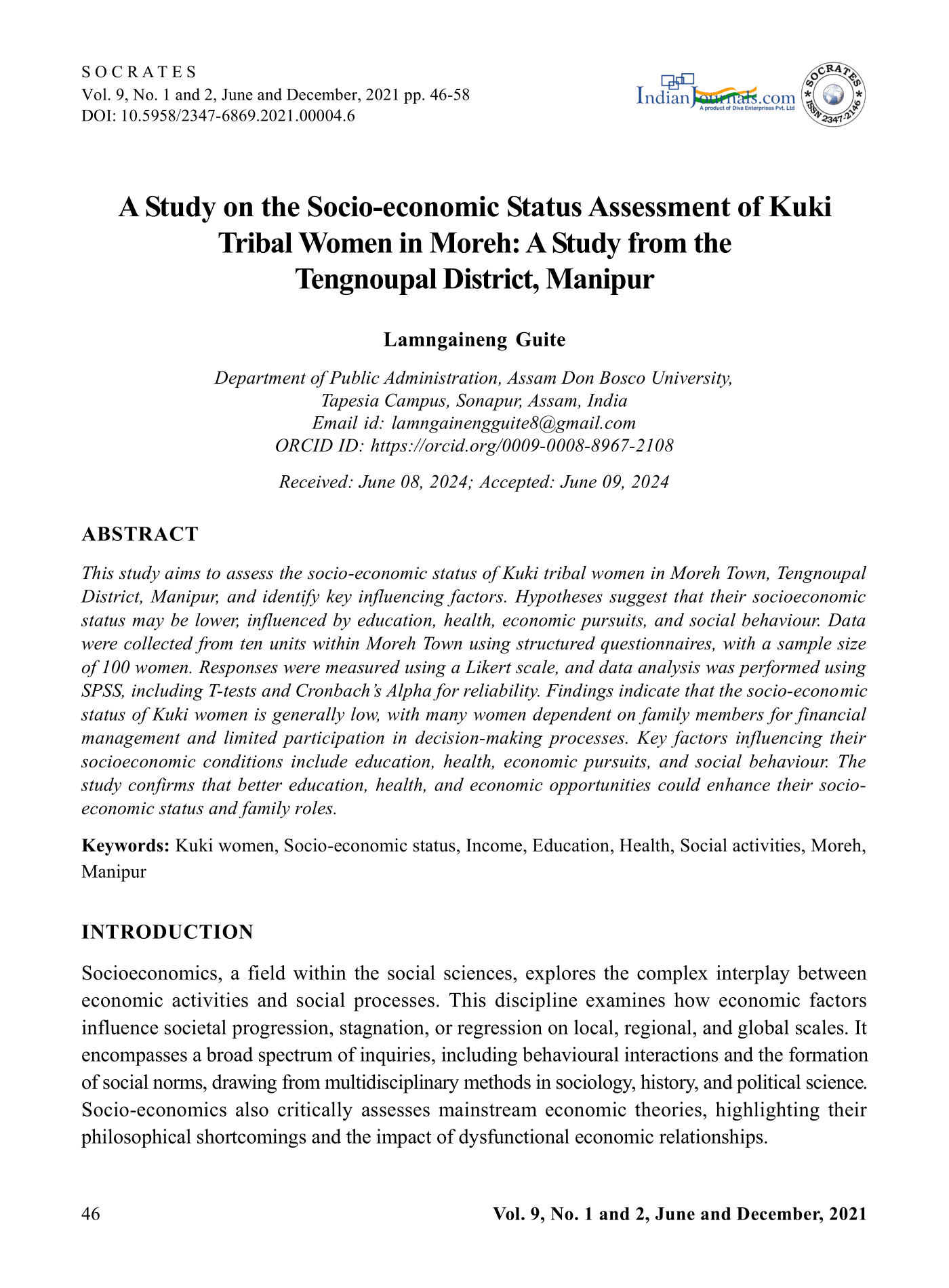A Study on the socio-economic status assessment of Kuki tribal women in Moreh <b>a study from the Tengnoupal district, Manipur</b>
Main Article Content
Abstract
This study aims to assess the socio-economic status of Kuki tribal women in Moreh Town, Tengnoupal District, Manipur, and identify key influencing factors. Hypotheses suggest that their socioeconomic status may be lower, influenced by education, health, economic pursuits, and social behaviour. Data were collected from ten units within Moreh Town using structured questionnaires, with a sample size of 100 women. Responses were measured using a Likert scale, and data analysis was performed using SPSS, including T-tests and Cronbach’s Alpha for reliability.
Findings indicate that the socio-economic status of Kuki women is generally low, with many women dependent on family members for financial management and limited participation in decision-making processes. Key factors influencing their socioeconomic conditions include education, health, economic pursuits, and social behaviour. The study confirms that better education, health, and economic opportunities could enhance their socio-economic status and family roles.
Downloads
Article Details
Section

This work is licensed under a Creative Commons Attribution-NonCommercial 4.0 International License.
Attribution-NonCommercial 4.0 International (CC BY-NC 4.0)

How to Cite
References
Alvesson, M. (1998). Gender relations and identity at work: A case study of masculinities and Femininities in an advertising agency. Human Relations,51(8),969–1005. https://doi.org/10.1177/001872679805100801
Bhasin, V. (2007). Status of tribal women in India. Studies on Home and CommunityScience,1(1),1–16. https://doi.org/10.1080/09737189.2007.11885234
Devi, Takhellamban Rita. (2010). Socio-economic role of women in Manipur. http://hdl.handle.net/10603/41174
Gangte, Thangkhomang S. (1989). Socio cultural life of the Kukis of Manipur a historical analysis.
Haobijam Victoria. (n.d.). Socioeconomic status of kuki tribal women: A case study of Churachandpur district https://www.idosi.org/aejsr/9(5)14/2.pdf
Haokip, Arfina. (2012). Position of women in the Kuki society of Manipur: A historical study. http://hdl.handle.net/10603/103912
Haokip, Sonkhojang D. (2006). A study on the traditional religion of the Kukis before the advent of Christianity. http://hdl.handle.net/10603/103667
Kipgen, Seikhohao. (2005). Political and economic history of the Kukis of Manipur. http://hdl.handle.net/10603103911
Kipgen, LH Hoinu Tracy. (2021). Kinship social obligations and Christianity study on the kukis of Manipur. http://hdl.handle.net/10603386402
Maring, Khullak Meson. (2018). A study of women vendors livelihood and health status in Manipur: A case study of an Indo-Myanmar border town Moreh. http://hdl.handle.net/10603/323046
Mary, Bachaspatimayun. (2008). Religion and society of the Kuki tribe in Manipur. http://hdl.handle.net/10603/59178
Patel, V. (2013). Book review: Socio-economic development of tribal women: Changes and challenges. Social Change, 43(1), 140–142. https://doi.org/10.1177/0049085713475738
Sitlhou Hoineilhing (2015) Patriarchal Bargains and Paradoxical Emancipation: Issues in the Politics of Land Rights of Kuki Women
Status of tribal women in India. Social Change. Dec. 1993. 23 ... (n.d.). http://www.womenstudies.in/elib/tribals/st_status_of_tribal.pdf
Socio-economic status of tribal women - citeseerx. (n.d.-a). https://citeseerx.ist.psu.edu/viewdoc/download?doi=10.1.1.852.8874&rep=rep1&type=pdf
Sophia, A. (2020). Women and work in Manipur. International Journal of Advanced Research, 8(11), 429–443. https://doi.org/10.21474/ijar01/12024
Tuboi, Paochon. (2005). Socio-cultural life of the Kukis in Manipur. http://hdl.handle.net/10603/60779

